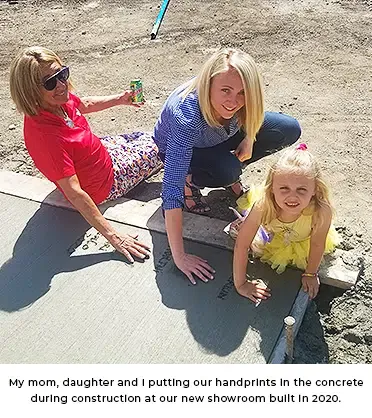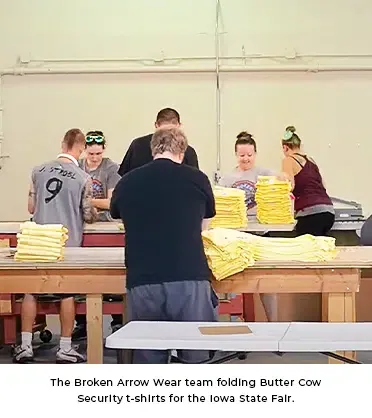Family businesses don’t come with a manual. After 15 years running the one my mom started, these are the 10 truths I’d want my kids to hear—before they ever step into my shoes.
I was around 7 years old the first time I remember carefully catching freshly screen printed t-shirts as they came off of the dryer. Our family business started when I was three, so it’s basically been woven into my DNA. I grew up counting shirts, making deliveries and talking about business at the family dinner table. Even back then, watching my parents work their butts off to build something from nothing, I knew I wanted to run it someday.
Today, 36 years after it started and 15 years after I gradually took over from my parents, our little family business has grown into a multi-million-dollar custom apparel company. I’d like to think we qualify as part of the only 30% of second-generation businesses that actually succeed—and with studies showing only 13% make it to the third generation, those odds feel both humbling and daunting.
Now that my kids are getting older and starting to talk about working in the business too, it got me thinking about everything I wish I had known before diving headfirst into this world.
The truth is, being a second-generation business owner comes with unique challenges that most entrepreneurs never face. You’re not just building a business, you’re carrying forward a legacy, managing family dynamics, and often feeling the weight of not wanting to be the generation that lets it all fall apart.
So, without further ado, here are 10 things I’d want my kids to know about taking over the family business and living the entrepreneurial lifestyle.

1. It’s almost impossible to fully separate work from personal.
I’ve always tried to keep emotions out of the workplace—especially when they don’t help anything. Walking in the door in a bad mood doesn’t do anyone any good, and making emotional decisions usually bites you in the ass. I’ve gotten pretty good at thinking before I speak and trying to stay level-headed.
But at the end of the day… my mom is still my mom.
There are times when she’s trying to help me improve, and all I feel is disappointment in myself—like I’ve let her down. Even if that’s not what she meant at all, it hits different when it’s your mom.
The truth is, you’re never going to fully separate the personal and the professional. There’s always going to be some overlap. But you can figure out how to work with it—manage expectations, set boundaries, and have the kind of honest conversations that make it easier to leave work at work (and not bring work home). It takes practice, but it’s doable.
2. Crying doesn’t change anything – and nor does stressing.
You know how some life moments just rewire your brain? I had one of those in 2013.
We had just been struck by lightning—which sounds dramatic, because it was. In an instant, everything started to unravel. Our server got hit, and suddenly we couldn’t access quotes, orders, or any of our systems. I was 27, standing in our production facility, completely overwhelmed.
Then I got a call from Ann—my mom’s business partner, who’s basically known me my entire life. A tech from HP had just told her that our server probably wasn’t salvageable. It was the worst-case scenario, and I felt instantly shocked and overwhelmed. She must’ve heard it in my voice too, because when I started to break down, she said something I’ll never forget:
“Kortni, crying isn’t going to change anything.”
Ouch. It stung. But she was right—and I needed to hear it.
That moment stuck with me. Not because it was cold, but because it was honest. When everything feels like it’s crashing down, you can cry, you can panic, you can stress—but it’s just not a productive use of energy. I shift my mind set to problem-solving instead.

3. You’ll never have a 9 to 5.
Running a business means you show up when you’re needed – not just when it’s convenient. Some days I stay late because my team is still working, and it feels wrong to leave. Other days, it’s a customer emergency or equipment failure. And sometimes… you find yourself driving across state lines for t-shirts.
In 2013, the Butter Cow at the Iowa State Fair was vandalized. We jumped into action and launched a “Butter Cow Security” shirt as a joke—and it sold out in hours. It was a Friday, and reordering blanks from our vendor meant we wouldn’t get more shirts until Monday. That didn’t work for me because it didn’t work for the customer. I dropped what I was doing and hopped in the cargo van with a friend and drove to Minnesota to pick up blanks by 7PM that same night from a t-shirt blank supplier. We drove home that night. By 5AM Saturday, a team was printing. By 10AM, fresh shirts were delivered to the Fair.
The tees ended up being one of their largest fundraising events, so it was more than worth it. That wouldn’t have happened if I only worked 9 to 5. The truth is: the business doesn’t run on a clock. And if you want to lead it, neither can you.
4. There is great power in these two words: “I’m Sorry”
Even when it’s hard, I’ve learned that saying “I’m sorry” can completely shift the tone of a conversation. It disarms defensiveness and changes the dynamic in the moment—which can change the outcome altogether.
I had a little kerfuffle recently with a vendor rep I’d worked with for years. I heard he was upset with me—so naturally, I got a little upset with him, too. Things went downhill from there. When he came by to show us new products, I wasn’t exactly excited. Truthfully, I felt uncomfortable in my own “home,” which just wasn’t going to work—and certainly wasn’t going to lead to anything productive.
So, I walked right up to him and said something like, “Hey, I’m not sure what I did to upset you, but if I did—I’m really sorry.”
I could actually see the weight lift off his shoulders. Turns out, he was feeling just as uneasy about it as I was. Within a few minutes, we realized it was all a misunderstanding. We laughed, moved on, and honestly—I left that conversation with more respect for him than I’d ever had. All because I was willing to put my ego aside in that moment.
What I’ve learned is this: saying “I’m sorry” doesn’t mean you’re wrong. It doesn’t mean you’re giving in. It just means you care more about moving forward.
5. You don’t get to just walk away.
When times get tough—and trust me, they do—you don’t get to just walk away. You can’t update your résumé and start job hunting. You can’t clock out and leave the stress at your desk. When it’s your name on the line and your team counting on you, quitting isn’t an option.
There are days I don’t love my job. Days I’m tired, burned out, frustrated, or overwhelmed. But I don’t get to dwell in that space for long. I’ve got people relying on me—not just my family, but the team who shows up every day, whose livelihood depends on the decisions I make.
What I’ve learned is that I do have control—but it’s not about escaping. It’s about making changes. If I feel stuck or unhappy, I have the power to figure out why and fix it. And more often than not, solving the thing that’s making me want to “quit” ends up making the business better for everyone else, too.
The upside? I know exactly where I’ll be tomorrow—and next week, and next year. That stability keeps me moving forward. It gives me purpose. It forces me to grow. And even on the hard days, I wouldn’t trade that for anything.

6. You can change peoples lives, like actually change their lives.
I know it sounds cliché, and maybe you’re already rolling your eyes—but hear me out. This is one of those things I didn’t fully understand until I lived it: you can change someone’s life. Like, change it. And sometimes, they’ll change yours right back.
We had an intern from Malaysia working with us while she was on a student visa. She needed a sponsor to stay in the United States after school, and she asked me, and I said yes. Fast forward a few years—she got her H1B, then her green card, and now she’s a permanent resident. I’m not saying I did it all—she did the work—but I helped open the door. And in return, she’s become a major support in our business.
Saying yes to her wasn’t just a smart move for the company—it made me better, too. She shared her culture, introduced me to new foods, and reminded me that while we all come from different places, we’re more alike than not. One of my favorite things about her is that she accepts me exactly as I am—even when I ask a million questions about her culture, religion, language, whatever. She never makes me feel silly or ignorant. She sees my curiosity as what it is: a desire to learn and understand.
Whether it’s celebrating a new baby, navigating a divorce, or just riding out the everyday ups and downs, this role gives me a front-row seat to support the people I work with. And that’s not something I take lightly. Being in a position to help make someone’s life a little better—that’s one of the greatest privileges of being the one in charge.

7. Choosing a partner that supports this endeavor is a pretty big deal.
There have been nights I’ve worked until 2AM and had to be back at it by 5. There have been weekends where all of our plans got tossed out the window because something came up at work. And there have been plenty of days when I’ve come home totally drained, crabby, and not exactly a ray of sunshine.
This job doesn’t come with a normal schedule. It takes a partner who can roll with the chaos—who doesn’t blink when I don’t know what time I’ll be home, who picks up the slack when I can’t, and who gets that sometimes our life revolves around the business.
We’ve been married 15 years now, and over time, we’ve found our groove. He’s heard so much about work that he’s basically part of the team—coming up with ideas for our social media skits, helping brainstorm shirt designs for the local school, or even restocking the office vending machine.
He knew what he was signing up for… kind of. But let’s be real—neither of us really understood how much this job would take, or how much it would give. Through the stress, the wins, and all the unexpected stuff in between—he’s been there. And without that kind of support at home, this whole thing would be a lot harder.

8. You’ll never be a traditional parent.
I’m not the mom who’s home at 4PM when the bus pulls up. Most of my kids’ friends eat dinner around 5:00—but I’m still at work then. We usually eat around 8PM, and that’s just what works for us.
Sometimes, it’s hard. One time, I got a photo from our neighbor of her and my daughter making cookies after school—and I wasn’t there. That stung. I missed a memory. But I also get to do the random middle-of-the-day school activities, and I’m just down the street if my kids ever really need me. And they know I’ll show up—no question.
I hope that what I’m showing them is that work ethic and sacrifice matter. That being successful and present aren’t mutually exclusive. I had two entrepreneurial parents myself, and at the time, I didn’t realize how “not normal” our life was. But now? I’m grateful for it. I grew up watching what it means to work hard and still show up for your family—and I hope one day, they’ll feel the same.

9. No matter how much money you have, you can never buy time.
Mark Cuban said this once on Shark Tank, and it stuck with me—but I didn’t really get it until I was diagnosed with breast cancer in 2022.
Sure, I understood time was valuable. But in those first few days after my diagnosis, before I knew what the prognosis was, the concept of time completely changed. Suddenly, I didn’t know if I’d be here in six months… a year… to see my daughter graduate or get married someday. Any illusion I had of being in control of time? Gone.
Since then, I’ve made some real changes. I put my phone down more. I say yes to more cruises. I adjusted our business hours from 6:00 to 5:30 so my whole team gets more time at home. I can’t always say yes to everything, but work and money became one variable—not the variable.
Cancer gave me the greatest gift of all – perspective. I don’t take this for granted, I feel blessed that I can see things in a completely different way. They say its life changing, and it really is. Tomorrow is not guaranteed.
So, let me ask you:
If you knew you had less than 6 months left, what would you do differently today? I doubt anyone would say they’d work more.
10. You’ll be living on a prayer – literally.
I was raised in the church thanks to my mom, and I’m so grateful for that foundation of faith. Running a business is hard. Like, really hard. And there have been more moments than I’d like to admit when all I could do was pray and hope it would all work out.
One of those moments came right at the beginning of COVID. A customer—one that ordered every year —called to let me know they were canceling their annual event. Just like that, we had lost our first covid order. That’s when it hit me: this wasn’t going to be a blip. This was going to be a big deal.. And I had absolutely no control over what was coming next.
So I did what I’ve done in all of the scariest moments—I moved forward in faith. I didn’t know the answers. I couldn’t predict the outcome. But I believed we’d get through it. And we did.
If you’re going to survive in this kind of role, you’ve got to have something—a reason to keep going, a belief in something bigger than the mess in front of you, or at least a way to talk yourself through the hard stuff. For me, that’s faith. It’s what carried me through the darkest days, and it’s never let me down.
Running a family business like Broken Arrow Wear definitely isn’t always sunshine and rainbows—but it’s been one of the most meaningful parts of my life. I’ve made mistakes, figured stuff out the hard way, and grown right alongside this company. I’m proud to say we’ve made it to a second generation, and if my kids ever decide they want to carry it into the third, I hope these little nuggets give them a leg up. And hey—if you’re out there trying to navigate your own version of this kind of journey, I hope something here helps. It’s hard. But it’s worth it.
I’d leave to hear from you! What would you want your kids to know if they decided to follow the same career path that you did? Let me know in the comments 🙂

